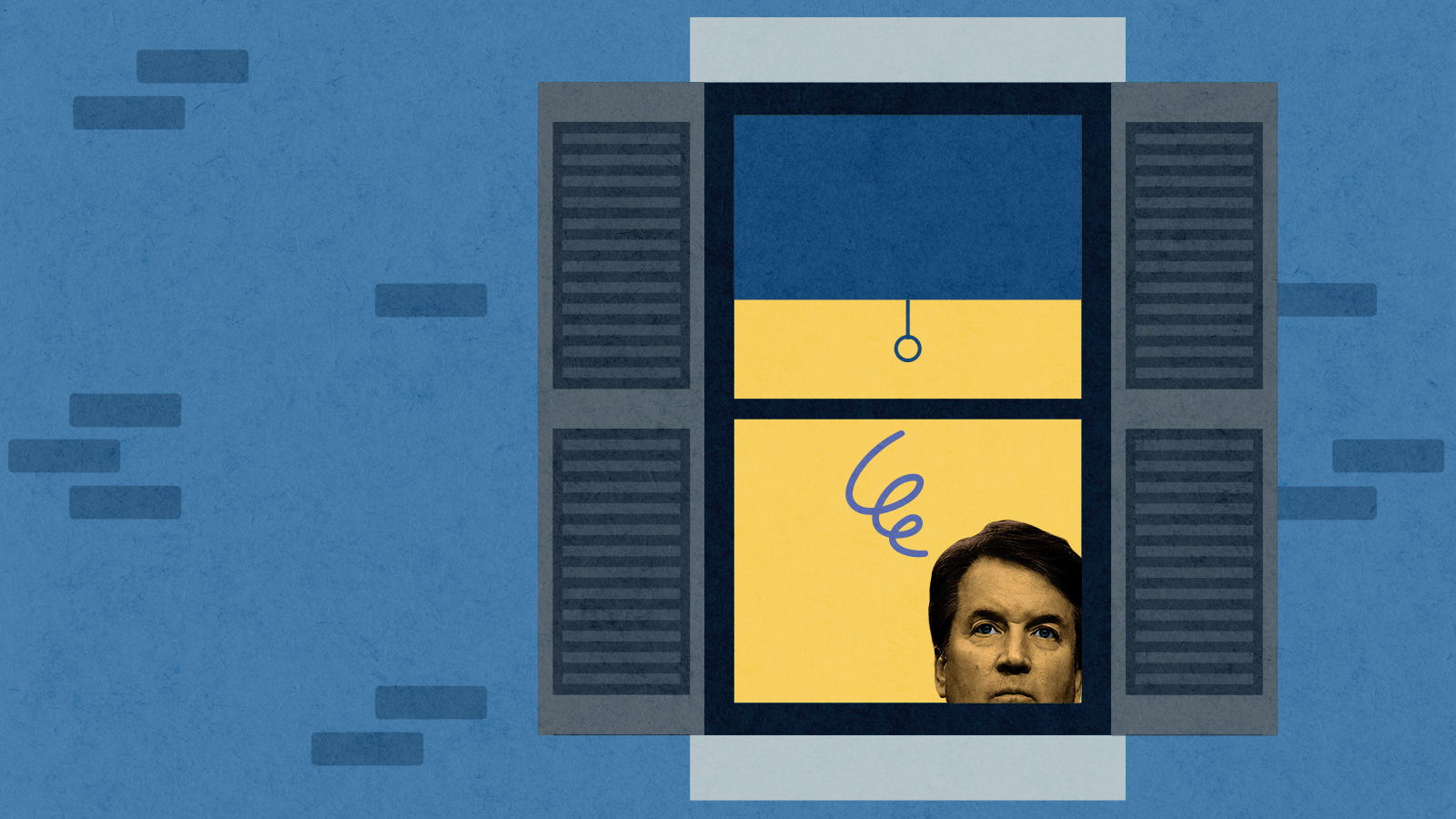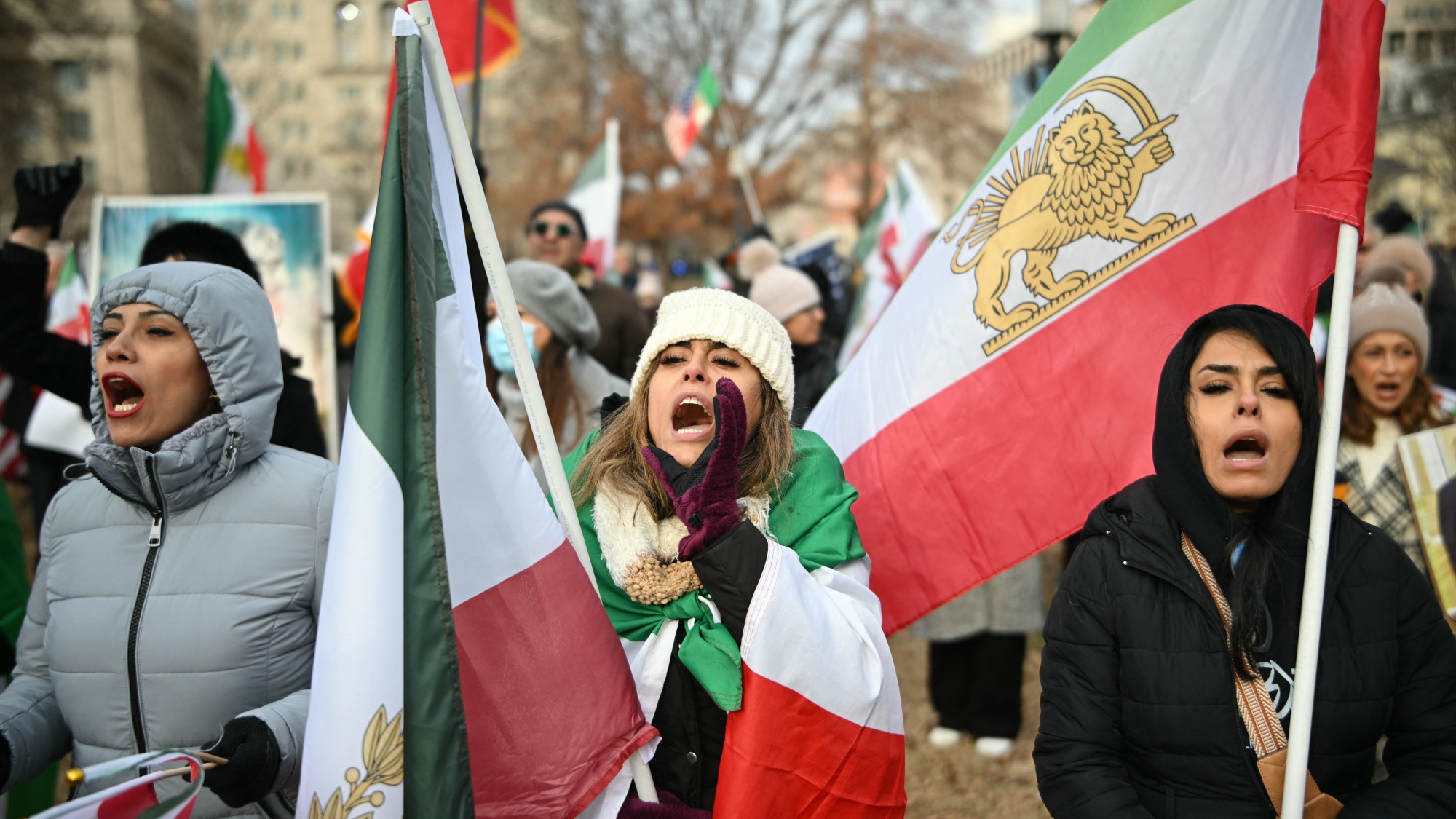People are angry at the Supreme Court over abortion. Let them vent.
Sometimes restraint is the better part of valor


A free daily email with the biggest news stories of the day – and the best features from TheWeek.com
You are now subscribed
Your newsletter sign-up was successful
One consequence of the leak of a draft opinion overturning Roe v. Wade is that pundits, activists, and other political junkies have been given considerable time to mull over the expected decision before it actually gets handed down. That has sparked a number of debates and controversies — about the moral and political consequences of overturning Roe, about the leak itself and what it means for the court, and about whether protesters should be allowed to gather and express their displeasure at the suburban homes of the conservative justices behind the decision.
The last of these resonates with a number of recent polarizing events, including the widespread protests, looting, and riots that followed the killing of George Floyd two years ago, and the insurrectionary violence on Capitol Hill on Jan. 6, 2021. That raises the stakes of the question, putting on the table how much social unrest we should permit, and by whom, and how the legal authorities should enforce order in politically fraught circumstances.
If law enforcement and prosecutors follow the letter of the law, then the protesters gathering outside the homes of Justices Brett Kavanaugh, Amy Coney Barrett, and Samuel Alito should be arrested and prosecuted. That's because it's a violation of federal law to protest outside the private homes of judges with an eye to influencing their decisions in pending cases. Supreme Court justices are nothing if not super-judges, and they are currently finalizing their votes and justificatory arguments in the Dobbs case that appears poised to overturn Roe. That makes any protest against them illegal.
The Week
Escape your echo chamber. Get the facts behind the news, plus analysis from multiple perspectives.

Sign up for The Week's Free Newsletters
From our morning news briefing to a weekly Good News Newsletter, get the best of The Week delivered directly to your inbox.
From our morning news briefing to a weekly Good News Newsletter, get the best of The Week delivered directly to your inbox.
But of course, law enforcement and prosecutors exercise discretion all the time, deciding when to enforce the letter of the law and when to use a lighter hand. This is a case where they would be well advised to continue with what they clearly are already doing — namely, allowing the modest-sized gatherings (including a small protest of 7 people cosplaying Handmaid's Tale outside Amy Coney Barrett's house on Wednesday evening) to continue. Law enforcement should remain present and intervene if any of the gatherings become disruptive, threatening, or veer toward violence. The justices and their families should also take full advantage of added security approved by unanimous consent in Congress earlier this week. But beyond that, the authorities should act with restraint.
This is the right move because of both the unprecedented consequences of the forthcoming Dobbs decision and the enduring character of small-d democratic politics. Assuming the majority opinion tracks with what was revealed in the leak, the nation's highest court will be eliminating a constitutional right that has stood for 49 years. That will have the effect of making many millions of American women less free than they have been for two generations. That's a very big deal and is bound to provoke anger at the perceived injustice. This indignation needs an outlet, and for most people, that outlet will be public protest.
Conservatives, naturally, disagree. Some simply assert that the law is the law — and whether or not we like or agree with it, the law must be enforced. Yet, as I noted above, law enforcement rarely works so automatically. Every time you drive faster than the speed limit, you are breaking the law. When a police officer chooses not to pull you over because you're only traveling 5 miles per hour over the limit and he's waiting to catch someone violating it more egregiously, that's an act of discretion. When he does pull you over but ends up letting you go with a verbal warning, that's discretion, too. Such judgment calls happen in law enforcement all the time, and in matters that go far beyond moving violations.
Others on the right make a more sweeping and complicated claim, insisting that the call for a modicum of permissiveness in protesting the Supreme Court justices is just the latest example of double standards — with the left expecting a pass for lawbreaking. Very few were arrested and prosecuted for the looting and riots that followed the killing of George Floyd, while the legal authorities have thrown the book at those involved in the Jan. 6 insurrection on Capitol Hill, even when it comes to those accused of misdemeanors.
A free daily email with the biggest news stories of the day – and the best features from TheWeek.com
These critics have a point, but only partially. Yes, in some cases authorities should have responded more forcefully to the violence that took place during the late spring and summer of 2020 — though that was a tough call, given that the protests were very widespread and in most cases began as a legal and justified outpouring of anger at what many considered the egregious injustice captured in the video of a Minneapolis police officer kneeling on Floyd's neck for several excruciating minutes. Because those protests were sparked by indignation at police brutality, authorities moving in force against protesters could have made the unrest even worse. Law enforcement therefore responded with considerable restraint — in retrospect, too much restraint, given the widespread damage, injury, and loss of life.
When it comes to the contrast to Jan. 6, what stands out to me is actually a similarity: a large protest gathered on Capitol Hill and authorities responded with much too little force to disperse it — including after it got way out of hand. Where things differ has been the aftermath, with federal prosecutors now aggressively prosecuting people who merely wandered into the building after the most violent and aggressive perpetrators had pushed their way inside. That seems like overreach in the opposite direction — discretion erring on the side of undue harshness. We should absolutely be throwing the book at everyone who ransacked the building and sought to commit acts of violence against members of Congress or the vice president in order to overturn the election. But that likely doesn't describe everyone, or even most of the people, present at the protests that day.
Then there's the difference many Democrats would point to: The injustices behind the 2020 unrest were real, whereas the anger of the Jan. 6 insurrectionists was entirely ginned up by lies about voter fraud spread by former President Donald Trump in an effort to keep himself in office illegitimately. I agree with these Democrats on both counts. But both are matters of political dispute that shouldn't play a part in influencing how law enforcement and prosecutors respond to acts of civil disobedience.
The same holds in reverse for those on the right who insist that those protesting the overturning of Roe are complaining about the loss of a constitutional right that never should have been considered a right in the first place. That's indeed how many conservatives view the 1973 abortion-rights decision. But that, too, is a matter of political dispute that those who favor Roe quite obviously reject. How the authorities respond to protesters should not be contingent on where they personally come down on that matter of political disagreement.
All of this leads to one simple insight: citizens in a democracy sometimes need to be given the means to blow off steam. Taking away a right that's been presumed to be embedded within the foundational law of the United States for half a century is a really big deal for a large chunk of the country. Conservatives shouldn't demand that those on the losing side of the Dobbs decision accept their defeat gladly. Let them vent and chant and cosplay wherever they wish, even on public streets outside the homes of those who signed off on the opinion, within reasonable limits and for a reasonable amount of time.
Sometimes the maintenance of civic comity requires a touch of restraint.
Damon Linker is a senior correspondent at TheWeek.com. He is also a former contributing editor at The New Republic and the author of The Theocons and The Religious Test.
-
 Political cartoons for February 12
Political cartoons for February 12Cartoons Thursday's political cartoons include a Pam Bondi performance, Ghislaine Maxwell on tour, and ICE detention facilities
-
 Arcadia: Tom Stoppard’s ‘masterpiece’ makes a ‘triumphant’ return
Arcadia: Tom Stoppard’s ‘masterpiece’ makes a ‘triumphant’ returnThe Week Recommends Carrie Cracknell’s revival at the Old Vic ‘grips like a thriller’
-
 My Father’s Shadow: a ‘magically nimble’ film
My Father’s Shadow: a ‘magically nimble’ filmThe Week Recommends Akinola Davies Jr’s touching and ‘tender’ tale of two brothers in 1990s Nigeria
-
 How did ‘wine moms’ become the face of anti-ICE protests?
How did ‘wine moms’ become the face of anti-ICE protests?Today’s Big Question Women lead the resistance to Trump’s deportations
-
 Supreme Court upholds California gerrymander
Supreme Court upholds California gerrymanderSpeed Read The emergency docket order had no dissents from the court
-
 ‘My donation felt like a rejection of the day’s politics’
‘My donation felt like a rejection of the day’s politics’Instant Opinion Opinion, comment and editorials of the day
-
 Is Alex Pretti shooting a turning point for Trump?
Is Alex Pretti shooting a turning point for Trump?Today’s Big Question Death of nurse at the hands of Ice officers could be ‘crucial’ moment for America
-
 Minnesota roiled by arrests of child, church protesters
Minnesota roiled by arrests of child, church protestersSpeed Read A 5-year-old was among those arrested
-
 How Iran protest death tolls have been politicised
How Iran protest death tolls have been politicisedIn the Spotlight Regime blames killing of ‘several thousand’ people on foreign actors and uses videos of bodies as ‘psychological warfare’ to scare protesters
-
 Unrest in Iran: how the latest protests spread like wildfire
Unrest in Iran: how the latest protests spread like wildfireIn the Spotlight Deep-rooted discontent at the country’s ‘entire regime’ and economic concerns have sparked widespread protest far beyond Tehran
-
 The billionaires’ wealth tax: a catastrophe for California?
The billionaires’ wealth tax: a catastrophe for California?Talking Point Peter Thiel and Larry Page preparing to change state residency
